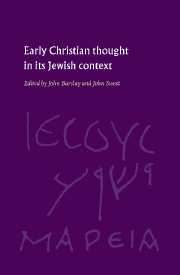Book contents
- Frontmatter
- Contents
- List of contributors
- Preface
- List of works by Morna D. Hooker
- List of abbreviations
- Chapter 1 Introductory Essay
- I THE SOCIAL CONTEXT OF EARLY CHRISTIANITY
- II SOME EARLY CHRISTIAN SOURCES
- III SOME EARLY CHRISTIAN THEMES
- Chapter 14 ‘In accordance with the Scriptures’
- Chapter 15 Land, sanctuary and worship
- Chapter 16 Monotheism and christology
- Chapter 17 Apocalyptic, God and the world.
- Chapter 18 Atonement and martyrdom
- Chapter 19 Halakhah and ethics in the Jesus tradition
- Index of names
- Index of subjects
- Index of texts
Chapter 19 - Halakhah and ethics in the Jesus tradition
from III - SOME EARLY CHRISTIAN THEMES
Published online by Cambridge University Press: 22 September 2009
- Frontmatter
- Contents
- List of contributors
- Preface
- List of works by Morna D. Hooker
- List of abbreviations
- Chapter 1 Introductory Essay
- I THE SOCIAL CONTEXT OF EARLY CHRISTIANITY
- II SOME EARLY CHRISTIAN SOURCES
- III SOME EARLY CHRISTIAN THEMES
- Chapter 14 ‘In accordance with the Scriptures’
- Chapter 15 Land, sanctuary and worship
- Chapter 16 Monotheism and christology
- Chapter 17 Apocalyptic, God and the world.
- Chapter 18 Atonement and martyrdom
- Chapter 19 Halakhah and ethics in the Jesus tradition
- Index of names
- Index of subjects
- Index of texts
Summary
Previous generations of scholars frequently approached the ethics of Jesus from a naïvely Christian perspective, by categorically asserting the superiority of his love command and the Sermon on the Mount to the supposed legalism and hide-bound casuistry of his Jewish contemporaries. More recently, however, the blossoming study of ancient Judaism has enabled us, perhaps for the first time since the first century, to explore Jesus' moral teaching meaningfully in its original setting.
All the main features of Jesus' ethics are deeply conversant with Jewish moral presuppositions. God is one and he is supreme. Ethics is therefore inalienably theonomous rather than autonomous: both the substance and authority of right behaviour have their source in the God of Israel. ‘Why do you call me good?’ Jesus asks. ‘No one is good but God alone’ (Mark 10.18 par.). The commandment to love God in the Shema' Israel, along with the love of one's neighbour, is for Jesus the heart of the Torah – as it was for some of his contemporaries (see Deut. 6.4f.; Mark 12.29; cf. Test.Iss. 5.2; t.Peah 4.19; R. Aqiba in y.Ned. 9, 41C36–37; Philo, Spec. 1.299–300).
To this day, textbooks continue to make much of the fact that explicit use of the Torah plays only a very minor role for the gospel writers. This in itself might seem to cast doubt on Jesus' indebtedness to Jewish moral teaching. Three points, however, must be raised in defence of our proposition.
- Type
- Chapter
- Information
- Early Christian Thought in its Jewish Context , pp. 264 - 278Publisher: Cambridge University PressPrint publication year: 1996



